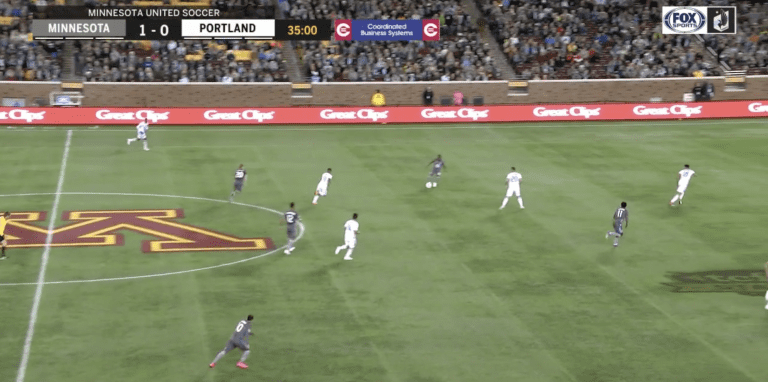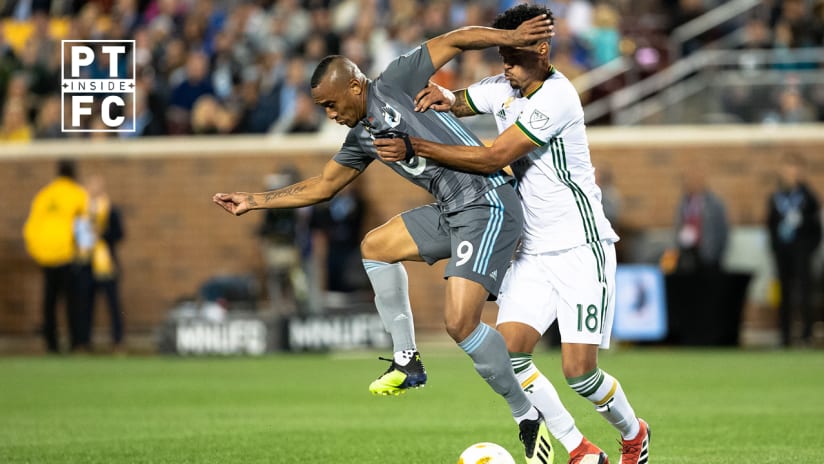So much for that theory.
One week ago, as the Portland Timbers were coming off a 4-1 loss at the Houston Dynamo, we used this space to highlight how different the team’s defense has been performing with and without Liam Ridgewell. Seven days later, we’re left looking for different explanations, as a backline featuring the veteran defender gave up five goals in games against Columbus Crew SC (ina 3-2 win on Wednesday) and Minnesota United (in a 3-2, Saturday road loss).
At the heart of last week’s analysis was a hope, one that tried to answer a question whose volume has grown louder: Why have the Timbers been so much different away from home, of late?
Sure, you could argue that, based on the last week’s scorelines, they’re not. They did “only” beat the Crew, 3-2. But eyes on that game would see, for a 60-minute stretch, a Timbers team that was markedly better than any version we saw against Minnesota or Houston, at D.C. United or Sporting Kansas City.
The numbers back it up, too. In terms of ratio of home points won (33, in the case of Portland) to road (14), only Real Salt Lake has a higher number among playoff contenders in the Western Conference. And in terms of goal difference between road and home, again, the Timbers are showing one of the greatest disparities in their half of Major League Soccer.
<p>Home points to<br>
road points</p> |
<p>Home goal difference (GD)<br>
minus road GD</p> |
|||
<strong>Rank</strong> |
<strong>Team</strong> |
<strong>Ratio</strong> |
<strong>Team</strong> |
<strong>Difference</strong> |
1 |
Minnesota United |
5.60 |
Minnesota United |
30 |
2 |
Real Salt Lake |
3.09 |
Real Salt Lake |
28 |
3 |
Colorado Rapids |
3.00 |
Portland Timbers |
27 |
4 |
Houston Dynamo |
3.00 |
Vancouver Whitecaps |
19 |
5 |
Portland Timbers |
2.36 |
LA Galaxy |
18 |
We can keep trying to think of reasons why this Jekyll and Hyde is not only playing out but, over the last two months, seems to be getting worse, but if solutions were so easy that I could capture them each Monday, that last Inside PTFC would have proved more prescient than it was. Or, Savarese and his staff, amid their different approaches to handling the problem, would have come up with something else; something that works.
At this point, the best we can do is catalog the symptoms, hoping understanding the symptoms might eventually lead to treating its cause.
Familiarity
Obviously, the Timbers are going to be more comfortable with playing weeks that end with games at home. Such is the case for every team in Major League Soccer, meaning going into each season, teams know they’ll have to develop ways to transcend. Home games offer one challenge; road, another. You have to find a way to deal.
And the Timbers have, for part of the season, getting points at places like Atlanta, Dallas, Los Angeles FC and Seattle. But lately, the team’s road form carries few reminders of the group that troubled Atlanta United early this summer. Something has changed.
Or, better yet, it might be a number of things piling up. We have talked about that complicated late-summer schedule, before – one that may yet be having an impact on the squad’s veteran legs – but with disappointment at Houston and Minnesota, we may also want to consider the field conditions.
After last year’s postseason, Timbers fans are more than familiar with those challenges in Houston, and in his halftime interview on Saturday with Nat Borders, Savarese said it was taking his team time to adjust to TCF Bank’s surface. That may explain this …
… and this …
… and this:
Bluntly, if other teams can manage these challenges, Portland can, too, but there is a reason why Minnesota is 9-4-1 at home this year and 1-12-2 on the road. It is, clearly, hard to play there. But if you want to be a good team, you have to be able to do hard things. But it in Houston or Minnesota, Portland could not.
That, though, may tie into something Savarese has talked about over the summer, something that was evident on Minnesota’s second goal (GIF, below). When Andy Polo plays his ill-fated through, neither of right back Alvas Powell nor left back Jorge Villafaña are in position to recover and help, defensively. They are liberated early, tasked with getting up field, leaving the Timbers susceptible to a moment like this.

Still, this is a part of Portland’s game that has to evolve. They can’t just be a team who, scared by two losses at the beginning of the season, doesn’t want to attack. They should want to take advantage of players like Powell and Villafaña. They should want to burn who are unable to account for them
Unfortunately, that requires familiarity. And to get there, there is a learning curve. What we saw at moments on Saturday was a lesson in that process, albeit one that’s having to be learned very late in the season.
Cohesion
Then there is an aspect to the rotation Savarese’s used to manage the schedule: how much key partnerships have actually played (or not played) with each other.
This was no more evident than when the offside trap being executed by Ridgewell and Julio Cascante failed to execute properly, as it appeared to happen here …
… and here:
That wasn’t the only place where you wondered about the relationships on the field. There were times in the first half when it was unclear whether the central defenders and the defensive midfielder, David Guzmán, knew who was responsible for the space in front of the defense. Not knowing Savarese’s instructions or what Ridgewell, Cascante and Guzmán had talked about, it’s difficult to lay blame when Minnesota had too much access to one of the most dangerous spots on the field, but moments like this …
… become too easy when players aren’t on the same page.
And then you remember: Because of injury, absence, or coaching choice, Guzmán and Ridgewell just haven’t played together much, this year. Nor have Cascante and Ridgewell. Perhaps that’s something Savarese has to consider differently, going forward, but on Saturday, it proved yet another obstacle that couldn’t be overcome.
Execution
Then there’s the stuff that’s more obvious, things that could come down to turf, or rotation, or a number of other causes. Ultimately, though, players have to execute in moments like these and just not give up the ball:
There has been a lot of searching for answers amid the Timbers’ summer inconsistency – a search we’re perhaps leading, in this new venture on Timbers.com. But some of that process might be so obvious, so uninteresting to talk about, that we might forget to mention: Sometimes, players just have to execute, whether it’s moments like the above or moments like this, where one Minnesota player is allowed to beat two Timbers on the dribble, creating a great chance for the Loons:
We have to consider there is something in the team’s approach that is leading to, on a player-performance level, road downturns. Is it tactical? Operational? Are the Christmas-Tree air fresheners in the team’s pre-flight Lyfts contributing to a mass hypnosis?
Or, are the players just not executing like they should on the road? Is it a mentality thing? Because when a pass clangs off your foot to an opponent, or you let a man dribble around and through your defense, it’s unclear if the air fresheners are the problem.
Consistency
There is an ultimate bottom line, here, though. We have seen how the Timbers are capable of playing, and although their recent home wins have been less convincing during their earlier run, that does provide a standard. How likely is it the team returns to that level is open for debate, but it provides a convenient point of comparison, whether we’re talking about home form or road.
And right now, both need to improve, but the team’s play away from home is a matter of urgency. Perhaps Portland can make the playoffs without improving in trips to Real Salt Lake and, to close the season, Vancouver, but it’s impossible to imagine them making a dent in the postseason without more consistency between home and road. And despite the team’s woes, that has to remind the goal: Making a dent in the postseason.












